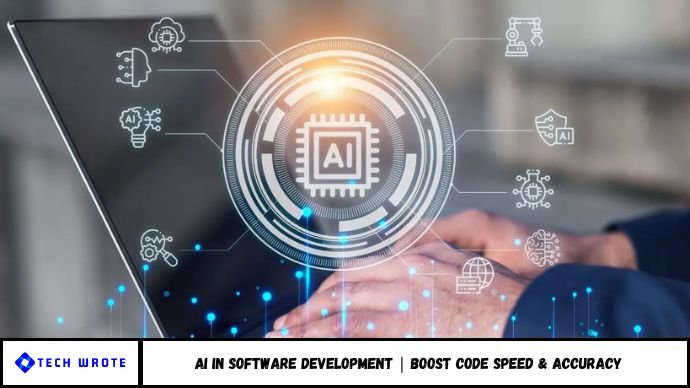AI in software development is reshaping the way developers write, test, and deploy code. From automating repetitive tasks to predicting bugs before they occur, AI tools are improving speed, efficiency, and code quality across the board. This article explores how artificial intelligence is revolutionizing software development, offering insights, use cases, and real-world examples
Artificial Intelligence (AI), especially large language models and generative AI, is transforming how software is built—from ideation to deployment. By integrating AI into your development process, you can streamline workflows, write code faster, reduce errors, and optimize project management.
Whether you’re generating entire blocks of code, automating testing procedures, or making data-driven decisions, AI empowers developers to code smarter and more efficiently. This technology helps cut development costs, shorten time to market, and increase overall productivity.
With AI tools, developers can:
- Automate repetitive coding tasks
- Generate and review code intelligently
- Perform real-time bug detection
- Accelerate software testing
- Enhance project planning and task tracking
Introduction: Is AI the New Developer’s Assistant?
Once considered futuristic, AI in software development is now a fast-growing reality. Tools like GitHub Copilot, Amazon CodeWhisperer, and ChatGPT are changing how code is written, reviewed, and optimized.
With development cycles shrinking and demand for software skyrocketing, traditional methods can’t keep up. Developers face increased pressure to deliver faster, cleaner, and more secure code—and AI is stepping up to meet that challenge.
1. The Rise of AI in Software Development
Why It Matters Now
According to Gartner, by 2027, over 80% of software development tasks will involve AI code assistants. AI is not replacing developers—it’s enhancing productivity and reducing human error.
Major Drivers of AI Adoption:
- Faster development cycles
- Increased complexity of codebases
- Rising demand for custom software
- Need for better security and performance
2. Key Areas Where AI Enhances Development
A. Code Generation & Auto-Completion
AI tools like GitHub Copilot and CodeWhisperer can:
- Suggest full code blocks in real-time
- Reduce manual typing and syntax errors
- Learn from context to generate accurate logic
B. Code Review & Debugging
- AI can detect bugs early in the process using pattern recognition.
- Tools like DeepCode and Snyk use AI to flag security vulnerabilities.
C. Software Testing
- AI-driven test case generation automates repetitive QA tasks.
- Predictive models detect edge cases developers might overlook.
D. DevOps and Deployment Automation
AI streamlines CI/CD pipelines, monitors logs, and predicts infrastructure failures.
E. Natural Language Processing for Requirements
Tools like ChatGPT can convert natural language requirements into pseudo-code, reducing miscommunication between stakeholders and developers.
3. Benefits of AI in the Coding Lifecycle
Efficiency and Speed
- Code is written faster, with fewer iterations.
- Reduces time spent on boilerplate code.
Improved Code Quality
- AI learns from millions of codebases, suggesting optimal structures and practices.
Cost Savings
- Less time debugging = fewer development hours wasted.
Enhanced Collaboration
- AI assists junior developers and acts as a knowledge base for teams.
4. Tools Leading the AI Development Revolution
| Tool | Function |
|---|---|
| GitHub Copilot | Code suggestions in real-time |
| Tabnine | AI-based auto-complete |
| Snyk | Security vulnerability detection |
| DeepCode | AI code review |
| Amazon CodeWhisperer | Context-aware coding suggestions |
| ChatGPT | Natural language understanding, explanation, and logic generation |
5. Challenges & Considerations
While AI brings immense value, it also comes with limitations:
- Accuracy is not guaranteed. AI can produce faulty logic or insecure code.
- Dependency risk. Over-reliance may hinder deep problem-solving skills.
- Data privacy. Be cautious when feeding proprietary code into cloud-based AI tools.
6. Best Practices for Using AI in Development
- Use AI as an assistant, not a replacement.
- Always review AI-generated code for accuracy and security.
- Train your team to work with AI tools effectively.
- Combine AI with traditional best practices.
- Stay updated on AI tool capabilities and limitations.
Frequently Asked Questions (FAQs)
1. What is AI in software development?
AI in software development refers to tools and algorithms that assist with coding, debugging, testing, and deployment processes.
2. Will AI replace software developers?
No, AI augments developer capabilities but still requires human oversight, logic, and creativity.
3. What are the benefits of AI code assistants?
They improve productivity, reduce errors, speed up development, and enhance code quality.
4. Are AI tools safe to use with proprietary code?
Caution is advised. Use tools that ensure data privacy or offer on-premises deployment.
5. Which AI coding tools are most popular?
GitHub Copilot, Tabnine, Snyk, and CodeWhisperer are widely used.
6. Can AI help with software testing?
Yes, AI can generate test cases, simulate environments, and detect bugs early in the cycle.
Conclusion
The era of AI in software development is here—and it’s just beginning. By integrating AI tools strategically, developers can code smarter, faster, and more securely than ever before.
But AI isn’t a magic bullet. It works best when paired with human insight, critical thinking, and rigorous validation.


